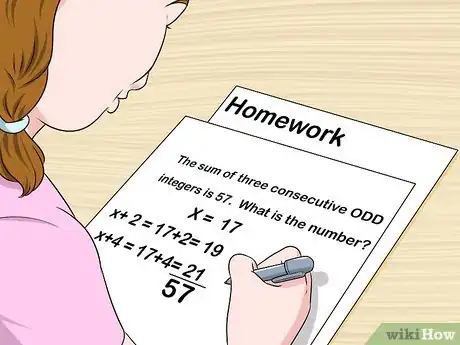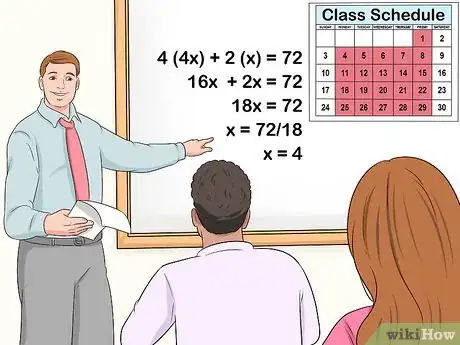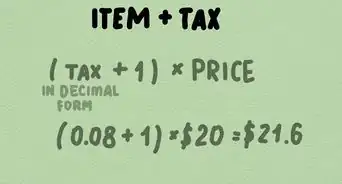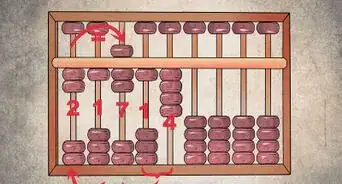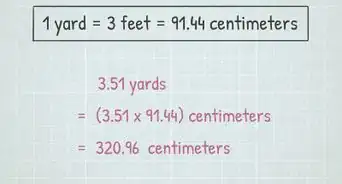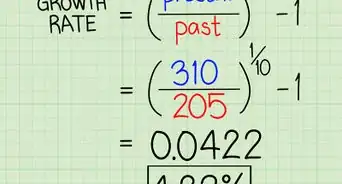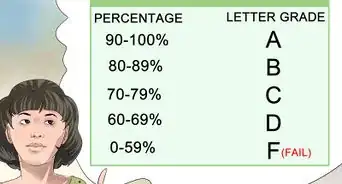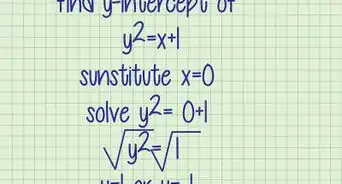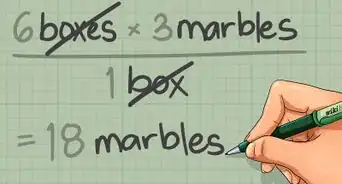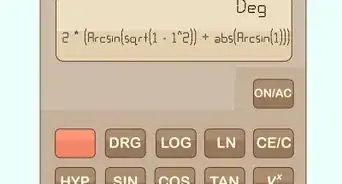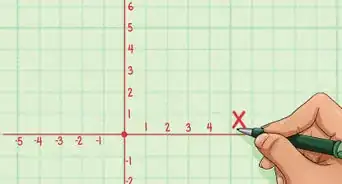This article was co-authored by Grace Imson, MA. Grace Imson is a math teacher with over 40 years of teaching experience. Grace is currently a math instructor at the City College of San Francisco and was previously in the Math Department at Saint Louis University. She has taught math at the elementary, middle, high school, and college levels. She has an MA in Education, specializing in Administration and Supervision from Saint Louis University.
There are 9 references cited in this article, which can be found at the bottom of the page.
wikiHow marks an article as reader-approved once it receives enough positive feedback. This article received 72 testimonials and 88% of readers who voted found it helpful, earning it our reader-approved status.
This article has been viewed 1,058,886 times.
Practice makes perfect when it comes to math - that’s why your teacher assigns so many tedious homework problems! Many people try to study for math by simply memorizing formulas and equations the way they would memorize facts and dates. While knowing formulas and equations is important, the best way to learn them is by using them. Start studying early, do your homework, and ask your teacher for help if you run into any issues.
Steps
Preparing for the Test
-
1Look over your class notes. After school, look over the notes you took in class that day for 15 to 20 minutes.[1] As a test approaches, review your notes for the entire unit or chapter more thoroughly. Pay special attention to the example problems the teacher provided in class, since these will help break down how a given procedure or formula works. If you don't have any class notes, ask your classmate for notes.[2]
- Take some time to highlight all the key vocabulary and topics you go over in your notes.[3]
-
2Do problems similar to those that were assigned for homework. Suppose you were assigned odd numbers for homework because the even numbers’ answers are in the back of the book. Work on those even-numbered problems, then check your answers to see where your strengths and weaknesses are.[4]
- Ask your teacher if your math book has an online website. Sometimes online textbooks can help by providing quizzes and additional instructional material.
EXPERT TIPGrace Imson is a math teacher with over 40 years of teaching experience. Grace is currently a math instructor at the City College of San Francisco and was previously in the Math Department at Saint Louis University. She has taught math at the elementary, middle, high school, and college levels. She has an MA in Education, specializing in Administration and Supervision from Saint Louis University.Math Instructor, City College of San Francisco
 Grace Imson, MA
Grace Imson, MA
Math Instructor, City College of San FranciscoTry solving for different parts of the equation. It's very important to learn to apply what you're learning to different cases. For instance, if you're studying the Pythagorean theorem, don't just solve it for one side—after you finish, solve it again for the other side, then for the hypotenuse.
Advertisement -
3Join a study group. Different people see concepts in different ways. Something that you have difficulty understanding may come easily to a study partner. If everyone in the group is confused about something, ask the teacher for help.[5]
- You could meet once or twice a week in person, talk over the phone, or chat online.
-
4Have someone make up practice problems for you. If you’re in a study group, you can create and exchange practice tests for each other. Ask a family member or someone in your class to work on practice examples together. If your textbook has a website, see if you can download practice exams.[6]
- Give yourself a time limit when taking a practice test to simulate the real thing.
-
5Reward yourself for studying hard. You deserve a break after a few hours of intense studying! Figure out some way to treat yourself after studying hard to help motivate yourself.[7]
- For example, you could have a candy bar, go on a bike ride, play a game for 20 minutes, or do another low-key activity you enjoy.
-
6Rest and eat well just before the exam. Try not to be stressed as the exam approaches. Get a good night’s sleep the night before the exam. Have a full breakfast that morning and, if the test is later in the day, a good lunch.[8]
- Eat plenty of nutritious foods rather than fast, processed ones.[9]
- Try having a light, healthy snack, like almonds. This will help give your brain a little more fuel before the test.
Going to Your Classes
-
1Attend class every day. Being there regularly is essential for learning well.
-
2Pay close attention. Showing up to class is half the battle, so listen and pay attention to the material. Seeing your teacher break down a problem on the board is key, since math is typically more visual than other subjects due to the equations and problem solving.[10]
- If you have trouble focusing, ask your teacher if you can sit in the front row.[11]
- Take good notes. Jot down any example problems from the session/class.[12] When you review your notes later on, you will have a better feel for the specific lesson that was taught, rather than relying on your textbook.
-
3Ask your teacher any questions you have before the exam. The teacher might not tell you specifically what is going to be on the exam, but they might give you helpful guidance if you don't understand.[13] Asking questions about material that confuses you will also show the teacher you care about doing well in the class.[14]
- Each night after school, look over your notes. Highlight any questions you have and take them to your teacher for further explanation.
- If you're in college, visit your math professor during their office hours.[15]
-
4Read the textbook. Make sure you read all of the assigned text and not just the examples. Textbooks often include proofs of the formulas that will help you understand the lesson much more thoroughly. Further, if you do the assigned reading, you'll be better prepared for each class, so you'll be able to actively participate.[16]
- Actively participating, or raising your hand to respond to and ask questions, will help your grade in the long run.
Studying Every Day
-
1Start studying as early as possible. Start preparing for the test on day one of the unit. Each night after class, look over your notes from that session. Cramming the night before will just overwhelm you.[17]
- If you give yourself time to study gradually, you’ll have a better shot at mastering the material. In addition, you’ll be able to identify weak spots and, if necessary, get extra help.
-
2Do your homework problems. Most classes have assigned, or at least suggested, problems that the teacher feels are most useful. Exam problems are often similar to homework problems, so doing your daily homework is like taking a little practice test each day.[18]
- If your textbook provides answers in the back of the book, use them only to check your work. If you choose to use them, try not to peek until after you've finished the assignment![19]
- Do all the work for each equation, and keep your homework papers. Use them to study as the test approaches. Never just copy someone else’s homework.
-
3Get to know how a formula works. It’s typically more useful to understand how a formula is derived than simply memorizing it. Memorization is a good first step, but getting a feel for why a formula works by doing plenty of practice problems will increase your shot at passing with flying colors.[20]
- For example, you could simply memorize the sum of a triangle's interior angles, which always add up to 180 degrees. However, if you really get a feel for that formula, you could use it to solve other problems, like figuring out an unknown angle in a hexagon.
Expert Q&A
-
QuestionHow do you stay focused in a boring class?
 Daron CamDaron Cam is an Academic Tutor and the Founder of Bay Area Tutors, Inc., a San Francisco Bay Area-based tutoring service that provides tutoring in mathematics, science, and overall academic confidence building. Daron has over eight years of teaching math in classrooms and over nine years of one-on-one tutoring experience. He teaches all levels of math including calculus, pre-algebra, algebra I, geometry, and SAT/ACT math prep. Daron holds a BA from the University of California, Berkeley and a math teaching credential from St. Mary's College.
Daron CamDaron Cam is an Academic Tutor and the Founder of Bay Area Tutors, Inc., a San Francisco Bay Area-based tutoring service that provides tutoring in mathematics, science, and overall academic confidence building. Daron has over eight years of teaching math in classrooms and over nine years of one-on-one tutoring experience. He teaches all levels of math including calculus, pre-algebra, algebra I, geometry, and SAT/ACT math prep. Daron holds a BA from the University of California, Berkeley and a math teaching credential from St. Mary's College.
Academic Tutor Request to sit in the front row, and make sure to put your cell phone away during class. If someone's distracting you, advocate for yourself and let your teacher know.
Request to sit in the front row, and make sure to put your cell phone away during class. If someone's distracting you, advocate for yourself and let your teacher know. -
QuestionShould I study on a table or a bed?
 ArianaCommunity AnswerStudy at a table; if you were to study on a bed, you may feel more tired and want to fall asleep.
ArianaCommunity AnswerStudy at a table; if you were to study on a bed, you may feel more tired and want to fall asleep. -
QuestionI study really hard for days before my math exam and do lots of practice questions. I get really good at it, but as soon as my teacher hands me the question paper I go blank. What should I do?
 Community AnswerYou are probably getting stressed and scared when the teacher hands out the test. There are many things you can do. First of all, don't cram all the material into your head a few days before the test. Try to study a bit each night for a few weeks before the test. Then, when the test comes, calm yourself down. Take a few deep breaths and imagine something that will make you happy, but don't get overly distracted. Just imagine that you are doing your homework, and not taking an exam. If you imagine hard enough, the stress will go away and you will remember everything you had studied.
Community AnswerYou are probably getting stressed and scared when the teacher hands out the test. There are many things you can do. First of all, don't cram all the material into your head a few days before the test. Try to study a bit each night for a few weeks before the test. Then, when the test comes, calm yourself down. Take a few deep breaths and imagine something that will make you happy, but don't get overly distracted. Just imagine that you are doing your homework, and not taking an exam. If you imagine hard enough, the stress will go away and you will remember everything you had studied.
References
- ↑ Daron Cam. Academic Tutor. Expert Interview. 29 May 2020.
- ↑ https://tutorial.math.lamar.edu/extras/studymath/howtostudymath.aspx
- ↑ Daron Cam. Academic Tutor. Expert Interview. 29 May 2020.
- ↑ https://math.osu.edu/undergrad/non-majors/resources/study-math-college
- ↑ https://www.uml.edu/sciences/mathematics/students/study-group-guide.aspx
- ↑ https://www.math.uh.edu/~dblecher/pf2.html
- ↑ http://coe.jmu.edu/learningtoolbox/check.html
- ↑ http://tutorial.math.lamar.edu/Extras/StudyMath/StudyForExam.aspx
- ↑ Daron Cam. Academic Tutor. Expert Interview. 29 May 2020.
- ↑ https://tutorial.math.lamar.edu/extras/studymath/howtostudymath.aspx
- ↑ Daron Cam. Academic Tutor. Expert Interview. 29 May 2020.
- ↑ Daron Cam. Academic Tutor. Expert Interview. 29 May 2020.
- ↑ Daron Cam. Academic Tutor. Expert Interview. 29 May 2020.
- ↑ https://kidshealth.org/en/teens/test-terror.html
- ↑ Daron Cam. Academic Tutor. Expert Interview. 29 May 2020.
- ↑ https://math.osu.edu/undergrad/non-majors/resources/study-math-college
- ↑ http://tutorial.math.lamar.edu/Extras/StudyMath/StudyForExam.aspx
- ↑ https://math.osu.edu/undergrad/non-majors/resources/study-math-college
- ↑ Daron Cam. Academic Tutor. Expert Interview. 29 May 2020.
- ↑ https://tutorial.math.lamar.edu/extras/studymath/howtostudymath.aspx
- ↑ http://mathstat.slu.edu/undergrad-math/success-in-mathematics/
About This Article
To study for a math exam, review your notes, paying close attention to the problems that the teacher explained in class. If you want to practice the kinds of problems that will be on the test, try redoing your past homework assignments. Or, if you're struggling to study alone, try joining a study group, since your classmates may be able to help you with concepts you don't understand. Alternately, ask a friend or family member to make up practice problems for you, or look for some online. For tips on how to remember tricky formulas, keep reading!


